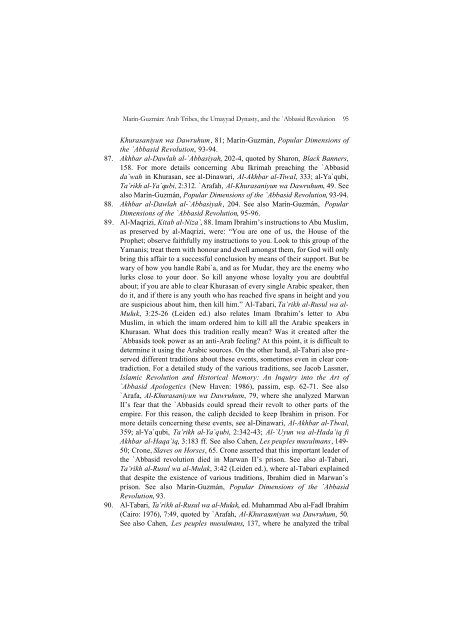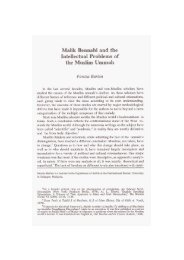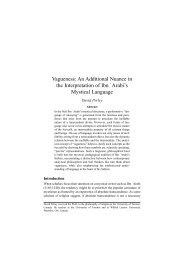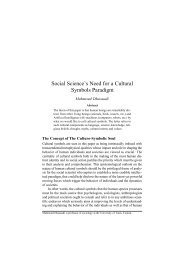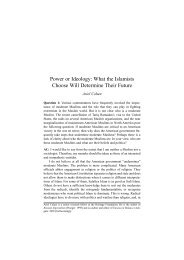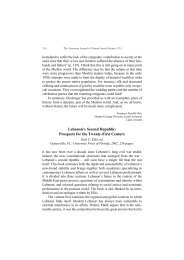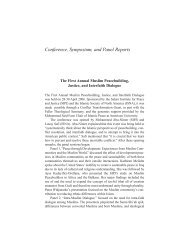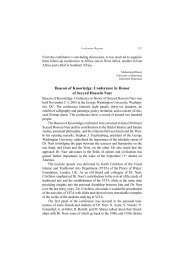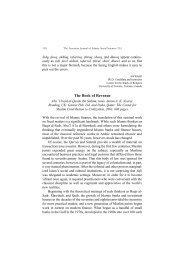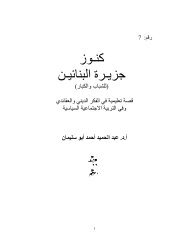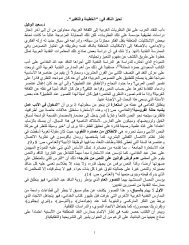Arab Tribes, the Umayyad Dynasty, and the `Abbasid ... - Epistemology
Arab Tribes, the Umayyad Dynasty, and the `Abbasid ... - Epistemology
Arab Tribes, the Umayyad Dynasty, and the `Abbasid ... - Epistemology
Create successful ePaper yourself
Turn your PDF publications into a flip-book with our unique Google optimized e-Paper software.
Marín-Guzmán: <strong>Arab</strong> <strong>Tribes</strong>, <strong>the</strong> <strong>Umayyad</strong> <strong>Dynasty</strong>, <strong>and</strong> <strong>the</strong> <strong>`Abbasid</strong> Revolution 95<br />
Khurasaniyun wa Dawruhum, 81; Marín-Guzmán, Popular Dimensions of<br />
<strong>the</strong> <strong>`Abbasid</strong> Revolution, 93-94.<br />
87. Akhbar al-Dawlah al-`Abbasiyah, 202-4, quoted by Sharon, Black Banners,<br />
158. For more details concerning Abu Ikrimah preaching <strong>the</strong> <strong>`Abbasid</strong><br />
da`wah in Khurasan, see al-Dinawari, Al-Akhbar al-Tiwal, 333; al-Ya`qubi,<br />
Ta’rikh al-Ya`qubi, 2:312. `Arafah, Al-Khurasaniyun wa Dawruhum, 49. See<br />
also Marín-Guzmán, Popular Dimensions of <strong>the</strong> <strong>`Abbasid</strong> Revolution, 93-94.<br />
88. Akhbar al-Dawlah al-`Abbasiyah, 204. See also Marín-Guzmán, Popular<br />
Dimensions of <strong>the</strong> <strong>`Abbasid</strong> Revolution, 95-96.<br />
89. Al-Maqrizi, Kitab al-Niza`, 88. Imam Ibrahim’s instructions to Abu Muslim,<br />
as preserved by al-Maqrizi, were: “You are one of us, <strong>the</strong> House of <strong>the</strong><br />
Prophet; observe faithfully my instructions to you. Look to this group of <strong>the</strong><br />
Yamanis; treat <strong>the</strong>m with honour <strong>and</strong> dwell amongst <strong>the</strong>m, for God will only<br />
bring this affair to a successful conclusion by means of <strong>the</strong>ir support. But be<br />
wary of how you h<strong>and</strong>le Rabi`a, <strong>and</strong> as for Mudar, <strong>the</strong>y are <strong>the</strong> enemy who<br />
lurks close to your door. So kill anyone whose loyalty you are doubtful<br />
about; if you are able to clear Khurasan of every single <strong>Arab</strong>ic speaker, <strong>the</strong>n<br />
do it, <strong>and</strong> if <strong>the</strong>re is any youth who has reached five spans in height <strong>and</strong> you<br />
are suspicious about him, <strong>the</strong>n kill him.” Al-Tabari, Ta’rikh al-Rusul wa al-<br />
Muluk, 3:25-26 (Leiden ed.) also relates Imam Ibrahim’s letter to Abu<br />
Muslim, in which <strong>the</strong> imam ordered him to kill all <strong>the</strong> <strong>Arab</strong>ic speakers in<br />
Khurasan. What does this tradition really mean? Was it created after <strong>the</strong><br />
<strong>`Abbasid</strong>s took power as an anti-<strong>Arab</strong> feeling? At this point, it is difficult to<br />
determine it using <strong>the</strong> <strong>Arab</strong>ic sources. On <strong>the</strong> o<strong>the</strong>r h<strong>and</strong>, al-Tabari also preserved<br />
different traditions about <strong>the</strong>se events, sometimes even in clear contradiction.<br />
For a detailed study of <strong>the</strong> various traditions, see Jacob Lassner,<br />
Islamic Revolution <strong>and</strong> Historical Memory: An Inquiry into <strong>the</strong> Art of<br />
<strong>`Abbasid</strong> Apologetics (New Haven: 1986), passim, esp. 62-71. See also<br />
`Arafa, Al-Khurasaniyun wa Dawruhum, 79, where she analyzed Marwan<br />
II’s fear that <strong>the</strong> <strong>`Abbasid</strong>s could spread <strong>the</strong>ir revolt to o<strong>the</strong>r parts of <strong>the</strong><br />
empire. For this reason, <strong>the</strong> caliph decided to keep Ibrahim in prison. For<br />
more details concerning <strong>the</strong>se events, see al-Dinawari, Al-Akhbar al-Tiwal,<br />
359; al-Ya`qubi, Ta’rikh al-Ya`qubi, 2:342-43; Al-`Uyun wa al-Hada’iq fi<br />
Akhbar al-Haqa’iq, 3:183 ff. See also Cahen, Les peuples musulmans, 149-<br />
50; Crone, Slaves on Horses, 65. Crone asserted that this important leader of<br />
<strong>the</strong> <strong>`Abbasid</strong> revolution died in Marwan II’s prison. See also al-Tabari,<br />
Ta’rikh al-Rusul wa al-Mulak, 3:42 (Leiden ed.), where al-Tabari explained<br />
that despite <strong>the</strong> existence of various traditions, Ibrahim died in Marwan’s<br />
prison. See also Marín-Guzmán, Popular Dimensions of <strong>the</strong> <strong>`Abbasid</strong><br />
Revolution, 93.<br />
90. Al-Tabari, Ta’rikh al-Rusul wa al-Mulak, ed. Muhammad Abu al-Fadl Ibrahim<br />
(Cairo: 1976), 7:49, quoted by `Arafah, Al-Khurasaniyun wa Dawruhum, 50.<br />
See also Cahen, Les peuples musulmans, 137, where he analyzed <strong>the</strong> tribal


